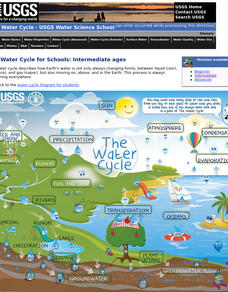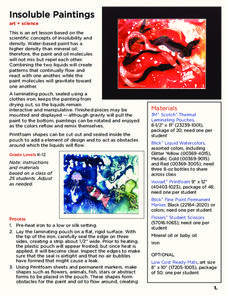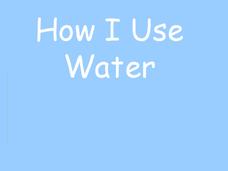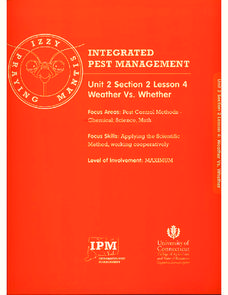Curated OER
WS 7.1 Kinetic-Molecular Theory of Gases/Pressure
In this kinetic molecular theory worksheet, students summarize the points of the kinetic molecular theory, they answer questions about pressure, and draw diagrams to show how suction cups, drinking straws and barometers work.
Curated OER
Classification of Matter
This is a great worksheet with an infographic to assist your students in categorizing matter into mixtures and non-mixtures. Information is given about the metric system of measurement. Your young students match 13 terms with their...
Science Geek
Thermochemical Calculations
Viewers learn where the heat goes when phase changes take place with a presentation that explains the latent heat of phase changes, or, more specifically, the molar heat of fusion, solidification, vaporization, and condensation. The show...
American Chemical Society
The Ups and Downs of Thermometers
What has a thermometer earned that your pupils haven't? A degree! After reviewing the previous lessons about molecules and degrees, scholars observe how thermometers work before building their own. The module includes a activity sheet.
Teach Engineering
Concentrate This! Sugar or Salt...
Heat up your lessons on boiling points. The resource provides a three-part activity: first, groups find the boiling point of solutions; second, they create boiling point curves for salt and sugar solutions; and third, they mix a solution...
US Geological Survey
The Water Cycle for Schools: Intermediate Ages
Water can travel from the highest mountain tops to the largest oceans. Using an interactive, young scientists trace the movement using an interactive online resource. They follow the water cycle by reading pop-up explanations on a...
Curated OER
Heterogeneous Equilibrium: Measurement of a Partition Coefficient
In this chemistry worksheet, young scholars examine a concept in science and then use the knowledge in application by conducting an experiment.
Curated OER
Metals and Non-metals
A half-page chart compares the properties of metals and nonmetals. Properties include appearance, melting and boiling point, density, strength, malleability, ductility, heat and electrical conductivity, and the nature of their oxides....
Curated OER
Insoluble Paintings
Use this art lesson to study insolubility and density. Combining water-based paint and mineral oil will cause a fun and interactive painting. This is a great art project to incorporate during a science unit.
Curated OER
Chapter 12 Review, Section 1: Solutions
Here is a different approach to solutions: a instructional activity that has chemistry learners use words to describe them! This is an outstanding exercise that will stretch learners to show what they know. They answer questions...
Curated OER
Vapor Pressure
This extensive collection of slides begins with diagrams of molecules undergoing evaporation, progresses through methods of measuring pressure, demonstrates how to perform pressure calculations, and then explores the temperature-pressure...
Curated OER
How I Use Water
Beginning with a brief anticipatory set on how water is commonly used, this presentation evolves into a well planned lesson on the water cycle. Students will discuss vocabulary, label the parts of the water cycle, locate where water is...
Curated OER
A Device That Condenses Water
Fifth graders who are studying water vapor and the condensation process use this worksheet to help them understand the process of condensation. Most of the worksheet is simply a source of information, with a good descriptive paragraph...
Curated OER
Analogies
When you understand the relationships between words, your vocabulary and reading skills will increase! Work on a set of analogies with multiple choices for learners to select.
University of Connecticut
Weather Vs. Whether
Monarch butterfly populations have decreased by 90 percent over the past 20 years due to misuse and ineffectiveness of some pesticides. Given the challenge to increase pesticide safety and effectiveness, the class, through discussion,...
Teach Engineering
Investigating Contact Angle
Discover the properties of water-loving and water-hating surfaces. In the seventh installment of a nine-part series, scholars explore hydrophilic and hydrophobic surfaces by conducting an experiment. They observe surface coatings,...
Other popular searches
- Liquids and Solids
- Solids Liquids and Gases
- Solids Liquids Gases
- Measuring Liquids
- Solids, Liquids, Gases
- Solids, Liquids and Gases
- Solids Liquids Gas
- Measuring Volume of Liquids
- Layering Liquids
- Density of Liquids
- Properties of Liquids
- Solids Liquids

















